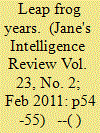|
|
|
Sort Order |
|
|
|
Items / Page
|
|
|
|
|
|
|
| Srl | Item |
| 1 |
ID:
184486


|
|
|
|
|
| Summary/Abstract |
These are difficult days, both with the war in Europe upsetting the whole international order and tense times in Israel-Palestine. There has been a rise in the number of Palestinians killed by the Israel Police and Border Police, some of them after they were wounded and lay on the ground. In most of the cases, the official Israeli announcement claimed that they were “neutralized” after stabbing attempts. Seven Palestinians were killed in February and 18 in March, including children, one of whom was only 14 years old, and two 80-year-old. On the Israeli side, 11 people were killed in late March in three armed attacks on civilian targets within one week — two of them by Palestinian Israelis associated with the Islamic State (ISIS) and one by a Palestinian from Ya’bad in the Jenin district — and three more civilians were killed 10 days later on Dizengoff Street in the heart of Tel Aviv.
|
|
|
|
|
|
|
|
|
|
|
|
|
|
|
|
| 2 |
ID:
149810


|
|
|
|
|
| Summary/Abstract |
Among possible future scenarios for the future of the Old City, some predict escalating conflict; some project passivity on one or both sides, leading to deterioration in the realities of the Old City; and others offer the prospect of an international regime — with varying forms of interaction between it and the two parties.
|
|
|
|
|
|
|
|
|
|
|
|
|
|
|
|
| 3 |
ID:
191404


|
|
|
|
|
| Summary/Abstract |
This article deals with ongoing attempts to recover heat and greywater at property level, based on an in-depth study of Stockholm, Sweden. We explore different socio-technical development paths from now up until 2050 using a novel combination of on-property technology case-studies, actor studies and system-level scenario evaluation, based on Artificial Neural Networks modelling. Our results show that the more conservative scenarios work in favour of large-scale actors while the more radical scenarios benefit the property owners. However, in the radical scenarios we identify disruptive effects on a system level due to disturbance on wastewater treatment plants, where incoming wastewater can be critically low for up to 120 days per year. At the same time, net energy savings are relatively modest (7.5% of heat demand) and economic gains for property owners small or uncertain. Current policies at EU and national level around energy-efficient buildings risk being counter-productive in cases when they push property owners to install wastewater heat recovery technology which, in places like Stockholm, can create suboptimal outcomes at the system level.
|
|
|
|
|
|
|
|
|
|
|
|
|
|
|
|
| 4 |
ID:
102144


|
|
|
| 5 |
ID:
105734


|
|
|
|
|
| Publication |
2011.
|
| Summary/Abstract |
This research investigates the relationship between Turkish residential electricity consumption, household total final consumption expenditure and residential electricity prices by applying the structural time series model to annual data over the period from 1960 to 2008. Household total final consumption expenditure, real energy prices and an underlying energy demand trend are found to be important drivers of Turkish residential electricity demand with the estimated short run and the long run total final consumption expenditure elasticities being 0.38 and 1.57, respectively, and the estimated short run and long run price elasticities being -0.09 and -0.38, respectively. Moreover, the estimated underlying energy demand trend, (which, as far as is known, has not been investigated before for the Turkish residential sector) should be of some benefit to Turkish decision makers in terms of energy planning. It provides information about the impact of past policies, the influence of technical progress, the impacts of changes in consumer behaviour and the effects of changes in economic structure. Furthermore, based on the estimated equation, and different forecast assumptions, it is predicted that Turkish residential electricity demand will be somewhere between 48 and 80 TWh by 2020 compared to 40 TWh in 2008.
|
|
|
|
|
|
|
|
|
|
|
|
|
|
|
|
| 6 |
ID:
163372


|
|
|
|
|
| Summary/Abstract |
On June 12, 2018, U.S. President Donald Trump and Democratic People’s Republic of Korea (hereafter DPRK or North Korea) leader Kim Jong Un, Chairman of the State Affairs Commission, met in Singapore for the first time. The two men signed a joint declaration and pledged to work toward denuclearizing the Korean Peninsula and improving bilateral relations. These developments raise several questions. What impact will this summit meeting between the two leaders have on regional security? What sorts of opportunities and risks will that impact produce for Japan? How should Japan deal with this fluid regional situation?
|
|
|
|
|
|
|
|
|
|
|
|
|
|
|
|
|
|
|
|
|